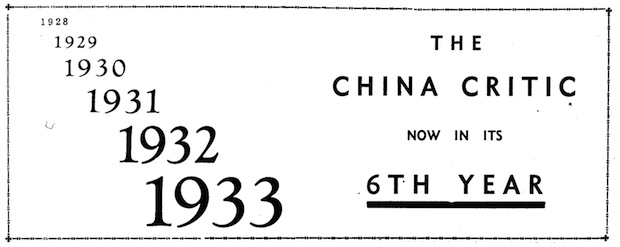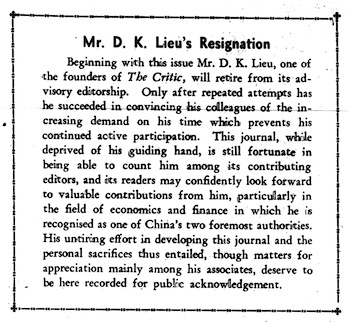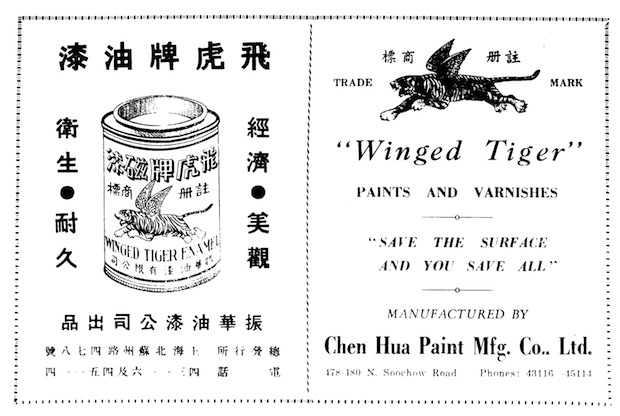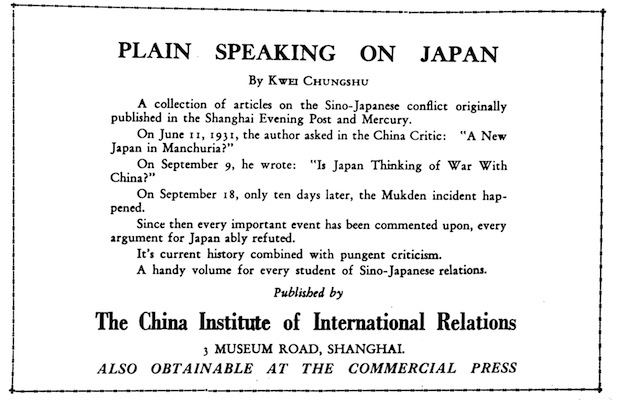FEATURES
The China Critic - 1933 | China Heritage Quarterly
The China Critic: a Chronology
William Sima
Australian Centre on China in the World
William Sima, whose research into the history and contents of The China Critic led to this combined issue of China Heritage Quarterly, has created a Chronology of the weekly. It follows the progress of The Critic from its first appearance in May 1928 through the highs and lows of the 'Nanjing Decade', and then through its various wartime permutations.
Will's Chronology, which is arranged by year below, accounts for the changing fate, and the friable editorial stance, of The Critic. It also provides numerous links to the articles under discussion allowing for them to be appreciated in an historical context.—The Editor
1928 | 1929 | 1930 | 1931 | 1932 | 1933 | 1934 | 1935 | 1936 | 1937 | 1938 | 1939 | 1940 | 1945
1933
12 January

Fig.1 The China Critic celebrates six years in print
In his article 'Communism in China', Lowe Chuan-hua 駱傳華 questions the reasons for the growth in the communist movement from 'a plane of harmless Marxian theorists' in 1919 to the 'powerful political movement' that they are today. Lowe considers an important factor is their popularity with Chinese workers and peasants who in particular have benefitted from particularly the Communist's agrarian reforms, which he somewhat regretfully admits the Kuomintang cannot match:
Whether we like it or not, the most alluring feature of the Communists in Southern and Central China today is their policy of agrarian revolution … Such a radical transformation in land tenure is a most disturbing problem for the present Chinese regime to face. Unless the Kuomintang, which has copiously advocated the doctrine of 'enabling the peasant to own the land he tills,' makes an equal attempt to improve the status of the Chinese peasantry and carry out certain long overdue reforms, Communism will not likely fade away in the rural districts. [Italicsadded]
(Eugene Lubot, an extract of whose Liberalism in an Illiberal Age we have included in the 'Features' section of this issue, highlights a number of other articles from The China Critic that express similar concern about the growth of communism.)
20 April

Fig.2 Announcement of D.K. Lieu's resignation from his position as advisory editor. Lieu is hailed as being 'one of China's two foremost authorities' in economics and finance, 30 March
This week's Editorial, 'Pearl Buck and Ourselves', comments on Buck's recent activities in New York, lauding her recent criticism of Christian missionaries in China:
That many of them [the missionaries] are often ignorant, narrow-minded and bigoted, as Pearl Buck has the good sense to point out… . While the missionaries come avowedly to save heathen souls for the glory of God and as an obligation they owe to some one in heaven, Pearl Buck can look a Chinese boy in the face and love him without remembering that he is her cousin by virtue of a theological myth.
This article includes extracts from an article in The New York Times, in which Pearl Buck had responded to criticism from Kiang Kang-hu 江亢虎—at this time a professorat McGill University in Montreal. Kiang had 'criticized her for depicting the “low-bred” Chinese who, according to Prof. Kiang, “certainly are not representative of the Chinese people.” ' The China Critic deemed Buck's response to this criticism to be 'so important that we are quoting passages from it as perhaps the most valuable contribution from a missionary to Chinese thought.'
In one of the extracts from The Times Pearl Buck charges Kiang with being an 'ignorant intellectual' of a kind that denies China's problems and is arrogantly ashamed of the poor—the kind of 'chauvinist' faux patriotism that she would later describe in her speech, 'The New Patriotism', in October (see below).
Kiang Kang-hu would later achieve notoriety as a functionary in the collaborationist regime led by Wang Jingwei 汪精衛; he died in prison in Shanghai, in December 1954.
15 June
In his special article 'An Appraisal of Chinese Newspapers', which originally appeared in the English supplement to the University newspaper Nankai Weekly, Chen Chin-jen 陳欽仁 discusses the importance of the newspaper to modern society as well as the quality of the Chinese press.
Chen concedes that while Chinese newspapers have significantly improved in recent years, they share a 'common weakness': the substandard quality of local news reports. '[T]he scoring of a “beat” or “scoop”—that is, to publish news ahead of rival newspapers—is something unknown to them'; a general lack of editorial oversight means that 'we often find two or three versions of the same news printed side by side'; and Chen goes on to list more points of criticism. He concludes with the following comments:
Most [Chinese newspapers] do not have the slightest inkling of the all-important truth that journalism is both a science and an art; they apparently believe that anyone who knows how to read and write can be a successfully journalist… . Unless, therefore, this erroneous notion is got rid of, Chinese journalism will find it most difficult, if not impossible, to surmount the obstacles besetting its road of progress.
20 July
With this week's 'Little Critic' column, 'Who are the True Chinese?', T.K. Chuan directs his attention tothe 'class of foreigners in China whose idea of Chinese culture is derived entirely from their contact with the so-called high-class Chinese.' Chuan cautions that these sophisticated and urbane 'Brahmins of Chinese society' should not be taken as representative of Chinese people generally, writing with a satirical voice that was characteristic of the 'Little Critic' column:
When they are angry with the rickshaw coolies, for instance, they would call them Chu Lo [豬玀]—pigs—or even kick them from behind. But when they are writing a learned dissertation on the Standard of Living of the Rickshaw Coolies in Shanghai, they would sentimentally refer to these poor fellows as “our hard-working and much oppressed brethren and comrades”… . Who are the true Chinese? That is our question. If we may trust Bertrand Russell and Mrs. Pearl Buck, they are certainly not to be found drinking Martini cocktails in the drawing rooms of the Shanghai élite.
17 August
The Editorial 'Sterilization in Germany' comments upon the passing, on 25 July, of a sterilization law preventing reproduction of the mentally insane and physically handicapped. Supporting the sentiments behind this law, the writer declares that 'from the eugenic point of view, the value and advisability of the law is now no longer questioned', noting also the large amount of money that the US spent for the 'maintenance of 394,991 defectives, dependents, and delinquents' in the year 1915. The writer is, however, clear in distinguishing his support for eugenics from approval for fascism, noting that 'the movement for sterilization has its own history, and is quite independent of and very much older than Hitlerism.' The writer, nonetheless, advocates the use of sterilization in China:
When will China be affected by movements of this nature can only be a matter of conjecture at present. It seems that while we have been rather fast in accepting abstract doctrines or government and social organization … we have been unusually slow in accepting anything that will materially raise our status as to health and ability to cope with the present difficult situation.

Fig.3 A bilingual advertisement for 'Winged Tiger' paints and varnishes, 飛虎牌油漆, 26 October
�
5 October
'Welcome Home, Mrs. Buck!' celebrates the return to China of the renowned American novelist. Commenting on the 'two mediums' through which Pearl Buck has endeavoured to introduce China to the West—her novel The Good Earth, and her recent series of public lectures about China in New York—the author writes:
Through the former medium, Mrs. Buck portrays China to the western nations just as many other foreigners do, except that her work as a piece of literary art is far more valuable than that of the 'traveller-writers.' Through the latter medium, Mrs. Buck informs an ignorant public of the real existing conditions with regard to the missionaries in the Far East… . Mrs. Buck has been a constructive critic; and as to seeking publicity, why, Mrs. Buck has plenty as a novelist without looking further for it!
12 October
A second version of 'The New Patriotism', an important and celebrated essay by the American novelist Pearl Buck, appears in this issue, based on an 4 October address that she gave at a reception celebrating her return to China.
Buck first makes a point to differentiate 'New Patriotism' from 'internationalism'. She associates the latter with notions of an impossible 'future Utopia' without national boundaries, one in which differences in language and culture no longer exist ('the world would be immeasurably poorer, and life far less rich, if this were true'); the term 'internationalism' is useful only as an 'understanding of, or at least respect for, our difference and the very right of these differences to exist.'
New Patriotism is also a reaction against a particular kind of chauvinism found in those who would call themselves of 'patriots', who 'will not acknowledge that anything in his country is wrong … [trying] to hide the very faults he knows instead of changing those faulty conditions.' Born of shame for poverty and wretchedness, such chauvinism leads to a lack of understanding and empathy between the wealthy and the poor.
In essence, New Patriotism espouses pride about Chinese culture and traditions, combined with a willingness to admit (and act to improve) social problems, foremost the plight of the poor—an issue of basic empathy and civic consciousness that arguably remains unsolved in China to this day: 'China today needs not the chauvinist who says he is not afraid to die for his country,' writes Peark Buck, 'China needs the patriot who is not afraid to live for his country.'
('The New Patriotism' is included in the 'Features' of this issue, along with a Chinese translation by Lin Yijin 林疑今, which appeared in Analects Fortnightly on 16 October 1933.)

Fig.4 Advertisement for 'Plain Speaking on Japan', by The China Critic's editor Kwei Chungshu 桂中樞, 14 December
�
21 December
Lin Yutang came to blows with 'Cassandra' in December last year over his alleged misogyny; this week in 'An Open Letter to Maurice Dekobra', he criticizes the French writer for commenting that Chinese girls were beautiful, and that he wanted to marry one. Dekobra's words, widely interpreted as being a 'sarcastic' insult to Chinese women, apparently caused a storm in the Chinese media at this time, with female students calling for a boycott of his books. Lin's 'open letter' accuses Dekobra of appealing to and exacerbating a Chinese 'inferiority complex':
Of course, nobody would believe you, least of all the Chinese girls themselves. Miss Pan, who led a boycott against you in Peiping, says of course you are sarcastic. Of course you a joking, and—this is what makes it unbearable—you are mocking at them… . No, M. Dekobra, we have been so bullied and bamboozled and disheartened that we can't believe anybody who says a good thing of China… . Of course, you know what I have been driving at. The phrase 'inferiority complex,' trite as it is, involuntarily crops up.
1928 | 1929 | 1930 | 1931 | 1932 | 1933 | 1934 | 1935 | 1936 | 1937 | 1938 | 1939 | 1940 | 1945
|